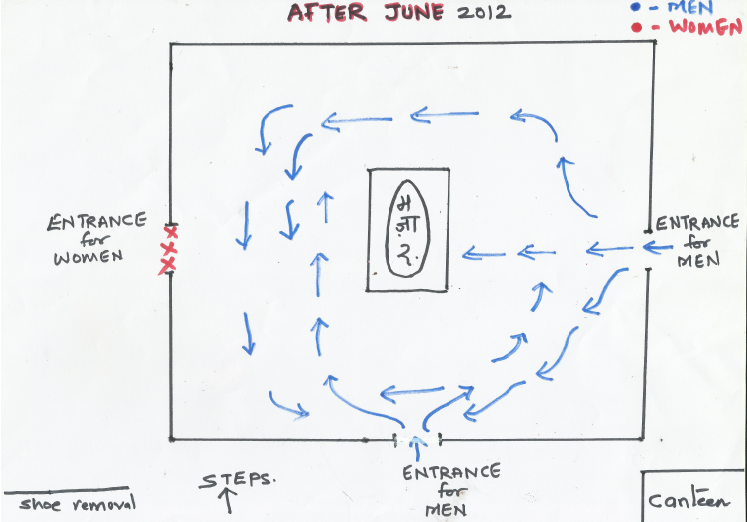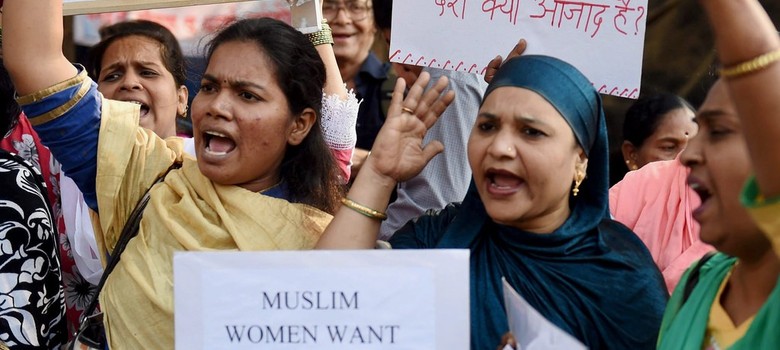
Before and after: How access to the mazaar has been blocked for women. Sketches by BMMA.
“Beyond our ideas of right-doing and wrong-doing,
there is a field. I’ll meet you there.
When the soul lies down in that grass,
the world is too full to talk about.
Ideas, language, even the phrase ‘each other’
doesn’t make sense any more.”
~ Rumi the Mystic
A new phase has arisen in the struggle for women’s emancipation, whereby women of faith are asserting their right to equal access to sacred space, be it a temple, masjid, church or a dargah (tomb). Even as they assert their constitutional rights as equal citizens of India, women are simultaneously challenging the patriarchal hegemony, male-centric interpretation of scripture and tradition.
In 2012 women were overnight barred from going close to or touching the mazaar (elevated grave) of Haji Ali, which is an iconic part of Bombay’s syncretic, secular landscape. Women questioned this “innovation” for which no reason or logic was offered by the dargah’s trustees.
Refusing to be pushed back, Noorjehan Safia Niaz and Zakia Soman, co-founders of the Bharatiya Muslim Mahila Andolan (BMMA) challenged the arbitrary manner in which the trustees had relegated women to second class believers. For two years they knocked on the doors of the Maharashtra government, but to no avail. The all-male trustees of the dargah refused to even meet them. They finally filed a petition in the Bombay High Court in 2014.
The case lingered on in the court, till on January 26 this year, when the Shani Shingnapur movement emerged, with a valiant group of women of the Bhumata Brigade led by Trupti Desai attempted to enter the sanctum sanctorum of the Shani temple in Ahmednagar.
This acted as a catalyst for women across all religions who no longer accept their relegation to an inferior status. For believing women it’s a question of spiritual equality.
They scoff at the laughable and irrational illogical arguments hurled at them including the notion of purity-impurity, challenge male-supremacist interpretation of religious scriptures, argue that tradition and culture be tested against constitutional principles of justice and parity. In debate after debate in the print and electronic media, women and progressive men have demolished the rationale offered by the religious orthodoxy.

Dharna organised by 'Haji Ali sab ke liye forum near Haji Ali dargah on April 28. Photo credit: PTI
Within days of the Shani Shingnapur agitation, at BMMA’s initiative, we held a cross-community protest demonstration at Azad Maidan, Mumbai to express our solidarity with the demand of women for equal access at Shani Shingnapur temple (Ahmednagar, Maharashtra), Sabarimala temple (Kerala) and elsewhere. The participants included BMMA activists led by Noorjehan, Khatoon Apa and, Zeenat Shaukat Ali (Islamic scholar), Jyoti Badekar (Vaghini), Javed Anand (Muslims for Secular Democracy), Salim Saboowala, Jatin Desai, this writer.
Some of our friends from within the secular fraternity were ambivalent or indifferent. A few even questioned the wisdom of secularists getting associated with women of faith demanding for gender parity in religious rituals and practices.
However a large majority among the progressives felt differently. Firstly, they argued that all of religion cannot be reduced to superstitious beliefs and blind faith. Secondly, being secular is not synonymous with being an atheist. Thirdly, the issue is not whether I believe or not, but the right of believing women to equality in the domain of religion. In other words, it was essentially a matter of right to equal access to sacred space. It was about democratising religious, social, cultural spaces and structures of beliefs and power.
The assertions and demands continued to grow encompassing the Sabarimala temple, the Trimbakeshwar temple (Nasik, Maharashtra), Haji Ali dargah, Mumbai. Soon the issue was being debated and discussed among sections of the Muslim community. Many Muslim women and men spoke out about the right of women to pray inside masjids (mosques).
On March 8, International Women’s Day, we organised a major programme at the Azad Maidan around the central theme: “Women from all religions have an equal right to worship and sacred space”. A separate march organised by various leftist, feminist organisations had also included this demand within their larger programme. Thus the assertion by women of faith was crossing new boundaries.
.jpg)
Azad Maidan solidarity demo in support of women's right to equal access to temples/dargahs at ; Photo credit: DNA
After the historic verdict of the Bombay High Court (March 31, 2016) in favour of women’s access to the sanctum sanctorum of temples across Maharashtra, some of us decided to take the struggle for women’s equal access to the Haji Ali dargah to the next level.
On April 20, a cross-community forum, ‘Haji Ali sab ke liye’ was launched jointly at a press conference by prominent Muslim intellectuals, activists and artists (men and women), supported by over a dozen secular-democratic mass organisations. The name of the forum had a simple but powerful inclusive message. It was a message that the Haji Ali trustees and their supporters found very difficult to counter.
At the press conference it was announced that a peaceful dharna will be held near Haji Ali Dargah on April 28. Trupti Desai who had shown interest in the forum’s initiative was invited to the press conference where she declared that she too would participate in the dharna along with other organisations and individuals.
The struggle for equality at Haji Ali dargah has raised some key questions that are now being widely debated within the Muslim community. It is also leading to a new assertion of Muslim women, who cannot see any logic in being treated as second class believers in masjids and some dargahs, even as they stride forward in the fields of education and employment.
Sanatani Hindutva organisations who had vehemently opposed Trupti’s temple entry agitation had earlier challenged her to enter Haji Ali dargah. It is to be noted that at the joint press conference she made no mention of her plans to enter the dargah on the day of the dharna.
In the backdrop of the Bombay High Court’s order on women’s right to enter the sanctum sanctorum of all temples throughout the state, some of the remarks from Supreme Court judges during the ongoing hearing in the Sabarimala temple case, and with the Bombay High Court’s ruling in the Haji Ali dargah case pending, all that the forum planned was a peaceful gathering of progressive Muslim women and men, along with leading secular organisations and activists. The objective was to create public awareness about the right of women to equal access, on par with men, to sacred spaces.
Before the proposed dharna, several TV news channels carried heated debates where several forum members were pitched against the Muslim clergy and other conservatives. The latter’s premise was that the Quran, Hadiths and Sharia prohibited women from getting close to the mazaar. Forum members and other progressive individuals participating in the debates asserted that this was not an issue concerning religion but custom and tradition which could not override constitutional principles.
Satyen Bordoloi
The conservatives claimed that the Indian constitution gives them the right to freedom of religion under Article 25 & 26, which is more important that the right of equality guaranteed under article 14. There were some who made the outrageous proposition that to the Sufi saints (men) buried in the dargah, women appear naked and that is why they must not be allowed up to the mazaar. Asked to explain the logic, if any, all they would say was: “It’s in the Sharia”.
It’s the very same non-logic that is applied by some for barring Muslim women from entering a cemetery, where the souls of the dead and buried, it is claimed, were hovering around and they too could see women naked. On being told that the same logic should apply to the souls of dead and buried women who could also see man as naked, they were speechless.
The fact is that Sharia appears to mean different things at different dargahs. Women are barred from getting close to Haji Ali’s mazaar since 2012, whilst at the Mahim dargah of Makhdoom Baba just a few kilometers away and at Ajmer Sharif (the dargah of the most revered Sufi saint in South Asia) there is no such restriction or gender segregation.
Yes, the constitution does grant minorities the right to religious freedom but not the right to discriminate and oppress women in the name of religion. Women are now asserting their right to interpret scriptures and personal laws, which is no longer the exclusive domain and monopoly of the male clergy.
As the day of our protest approached, the cacophony of our opponents also grew. Haji Arafat (Shiv Sena), Abu Asim Azmi (Samajwadi Party), Shamsher Khan Pathan (Awami Vikas Party), the Indian Muslim League, Owaisi’s MIM, all turned out in large number to prevent Trupti from entering the dargah premise.
Here both Trupti and the coalition against her erred. In yet again projecting an anti-women perspective, those arraigned against her provided ballast for the media. In unilaterally over-stepping the commonly agreed programme of the forum, Trupti herself created confusion and chaos.
In any case, the struggle for equality at Haji Ali dargah has raised some key questions that are now being widely debated within the Muslim community. It is also leading to a new assertion of Muslim women, who cannot see any logic in being treated as second class believers in masjids and some dargahs, even as they stride forward in the fields of education and employment.
It is also compelling the Muslim conservatives to take a fresh look at the many uncomfortable questions being raised at every TV debate. The Urdu press in Mumbai has also been supportive of the push for gender equality and this too is a welcome development.
The reality of the situation is that Muslim conservatives, fanatics and extremists stand exposed the world over, even as the edifice of extremist political Islam continues to implode.
The onus now lies on progressive, liberal Muslims. There is a need for Muslim intellectuals, scholars, lawyers, artists and activists within and outside secular democratic mass movements and political parties with broader agenda to join the struggle for long overdue reform.
The progressive Muslim women’s movement is already leading the struggle for equality and emancipation, reinterpreting the scriptures, asserting their constitutional rights, challenging the citadels of patriarchy. It’s time for progressive Muslim men to come out in large numbers, organise themselves and stand in solidarity with the struggle of Muslim women.
Today women have been relegated to an inferior status at the Haji Ali dargah. Tomorrow it could be other dargahs. Who knows, next they may demand that only those Muslim women wearing a burqa would be allowed. Then they might pronounce that music is haram so Qawalis are a no-no.
Where does this plague of patriarchy and fanaticism stop?
Which is the next dargah they will target?
Could it be the Ajmer dargah itself?
This is a battle we must not lose.
(The writer is among the initiators of the ‘Haji Ali Sab Ke Liye’ forum).

